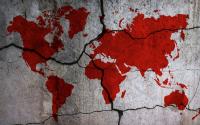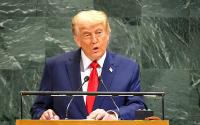31 May 2005Guardian
Rejoice! The world is saved! The governments of Europe have agreed that by 2015 they will give 0.7% of their national income in foreign aid. Admittedly, that's 35 years after the target date they first set for themselves, and it's still less than they extract from the poor in debt repayments. But hooray anyway. Though he does not become president of the EU until later this year, Tony Blair can take some of the credit, for his insistence that the G8 summit in July makes poverty history. It's inspiring, until you understand the context.
Everyone who has studied global poverty - including European governments - recognises that aid cannot compensate for unfair terms of trade. If they increased their share of world exports by 5%, developing countries would earn an extra $350bn a year, three times more than they will be given in 2015. Any government that wanted to help developing nations would surely make the terms of trade between rich and poor its priority.
This, indeed, is what the UK appears to have done. In March it published the most progressive foreign policy document ever to have escaped from Whitehall. A paper by the departments of trade and international development promised that: "We will not force trade liberalisation on developing countries." It recognised that a policy that insists on equal terms for rich and poor is like pitting a bull mastiff against a chihuahua. Unless a country can first build up its industries behind protectionist barriers, it will be destroyed by free trade. Almost every nation that is rich today, including the UK and the US, used this strategy. But the current rules forbid the poor from following them. The EU, the paper insisted, should, while opening its own markets, allow poor nations "20 years or more" to open theirs.
But two weeks ago the Guardian obtained a leaked letter showing that Peter Mandelson, the European trade commissioner, was undermining the UK's new policies. His most senior official complained that the policy document was "a major and unwelcome shift... Mandelson is taking up our concerns and will press for a revised UK line".
We are being asked to believe, in other words, that a man who owes his entire political career to Tony Blair, and who has repaid him with nauseating sycophancy, was conspiring to destroy his cherished policy. It doesn't look likely, and it doesn't take a great imaginative effort to see a double game being played. Before the election, Blair makes one of his tear-jerking appeals for love, compassion and human fellowship, and gets the anti-poverty movement off his back. After the election he discovers, to his inestimable regret, that love, compassion and human fellowship won't after all be possible, as a result of a ruling by the European commission.
This outcome was predicted by the World Development Movement when the remarkable paper was published in March. "Time will tell if the UK ... will put real political capital into this announcement, or if they will hide behind the European commission and claim inability to affect the negotiations." Nostradamus had nothing on these guys.
The idea that Blair had no more intention of introducing fair terms of trade than I have of becoming a Catholic priest gains credence from the UK's support for the bid by Pascal Lamy, Mandelson's predecessor, to become head of the World Trade Organisation - a post he won on Thursday. Making Lamy head of the WTO is as mad as making, say, Paul Wolfowitz... er, satire doesn't really seem to work any more.
Everyone seems to have forgotten that Lamy was the man who destroyed the world trade talks in Mexico in September 2003. He tried to force through new rules on investment, competition and procurement, which would have allowed corporations to dictate terms to the poor world's governments. He persisted with this policy even when he had lost the support of European governments, and when it became obvious that his position would force the poorer nations to pull out. For cynics like me, it wasn't hard to see why. For the first time in the WTO's history, the poor nations were making effective use of collective bargaining and demanding major concessions from the rich. By destroying the talks, Lamy prevented a fairer trading regime from being introduced. He left the rich countries free to strike individual treaties with their weaker trading partners. And the UK and the rest of Europe hid behind him.
So the poor world is going to need the extra aid, in 2015 and far beyond. This means that it will remain obedient to the demands of countries with an interest in its continued exploitation. Those demands have done more than anything else to hold it down. As the World Bank's own figures show, across the 20 years (1960-80) before it and the IMF started introducing strict conditions on the countries that accepted their loans, median annual growth in developing countries was 2.5%. In the 18 years after (1980-1998), it was 0.0%.
The British government has made its own contribution to the poor world's misery by tying aid disbursements to the privatisation of essential public services. It has been paying the Adam Smith Institute, a rightwing lobby group, up to £9m a year to oversee privatisation programmes in developing countries. Last week Tanzania pulled out of a deal our government had rigged up for the British company Biwater to privatise water supplies in Dar es Salaam.
Again the government admitted, before the election, that its critics were right. The Department for International Development (DfID) published a long mea culpa in which it promised: "We will not make our aid conditional on specific policy decisions by partner governments, or attempt to impose policy choices on them (including ... privatisation or trade liberalisation)." It looks great, until you read the whole document. On privatisation, DfID admits that there was "concern that in the 1980s and 1990s donors pushed for the introduction of reforms, regardless of whether these were in countries' best interests." The 80s and 90s, eh? What about the privatisation it was demanding in 2004 and early 2005? What about its recent assault on the public services of Tanzania, South Africa, Ghana and the Indian state of Andhra Pradesh? What about the money it is still paying the effing Adam Smith Institute?
DfID goes on to say that it will decide whether to give money to a country by looking "to the IMF to provide an assessment of a country's macroeconomic position". It knows full well that the IMF continues to judge countries by the degree to which they embrace privatisation and liberalisation. Yet again the British government is outsourcing its ethics, using the policy of an international body to make justice history.
While using the right language and flattering their critics, the UK and the EU are keeping the poorer nations where they want them: beholden to their patrons. Suddenly, an increase in aid doesn't look like such good news after all.






